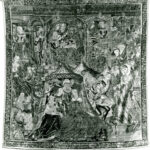BIOGRAPHY OF CHRISTIAN DE LA MAZIÈRE
Christian de la Mazière , born August 22, 1922 in Tunis, died February 15, 2006, was a French journalist.
The son of an officer who had taken part in the Russo-Polish War, he enlisted in September 1939. He remained in the Vichy army until 1942. Thereafter, he collaborated with the newspaper Le Pays libre, and joins the LVF, then the Waffen-SS.
He was one of the last survivors of the SS Charlemagne Division, a French-trained Waffen SS unit. In the last days of the Third Reich, units of this division fought in Berlin.
Christian de la Mazière was taken prisoner in Pomerania by Polish troops and handed over to the French authorities. Tried and sentenced to five years in prison in 1946, he lost his civic rights for ten years on French territory. He was pardoned by Vincent Auriol in 1948. Leaving Clairvaux, he held various positions over the following years, including those of impresario and set up a public relations agency in 1952. He worked at L’Echo de la Presse et de la Publicité, and La Correspondances de la Presse by Georges Bérard-Quélin.
He recounted his experience in particular, in the film Le Chagrin et la pitié, which told the story of the life of the French under the German occupation. He also testified to his commitment through a book, Le Rêveur casqué, which was the subject of several editions and translations but sounded the death knell of his public relations agency. It should be noted that he assigns himself the rank of officer, while he was at most only Rottenführer (master corporal). He will then be employed by the Figaro Magazine and in the Choc du mois., before joining General Eyadema in Togo as an adviser. Thirty years later, he will describe his post-war years in “The Wounded Dreamer”, explaining the consequences of his choices on his social and professional life. He was once the companion of Juliette Gréco, then of Dalida.
A Life of Transformation
Christian de La Mazière was a remarkable individual whose life journey took him from the heights of Nazi power to the depths of self-reflection and redemption. He would eventually become a symbol of moral courage and personal transformation.
In his early years, de La Mazière was drawn to the ideals of nationalism and military service. He joined the Hitler Youth and later the Wehrmacht, the German armed forces, as an officer during World War II. Despite his initial enthusiasm for the Nazi cause, his experiences on the Eastern Front and witnessing the atrocities committed by the Nazis profoundly shook his convictions.
De La Mazière’s turning point came in 1944 when he participated in the Battle of Normandy. Witnessing the devastation and loss of life caused by the war made him question the ideology he had once embraced. He realized that the Nazi regime’s actions were fundamentally opposed to his own sense of morality and humanity.
After the war, de La Mazière faced the challenge of confronting his past and finding a new purpose in life. He underwent a process of introspection and soul-searching, determined to make amends for his involvement with the Nazis. In 1947, he voluntarily surrendered to French authorities and was imprisoned.
During his time in prison, de La Mazière focused on self-education, engaging in deep study of philosophy, ethics, and theology. He grappled with the profound questions of personal responsibility, guilt, and redemption. His intellectual pursuits, coupled with his newfound conviction to fight against the dangers of extremism, laid the foundation for his transformation.
Upon his release from prison, de La Mazière embarked on a journey of reconciliation and public service. He became an advocate for understanding and tolerance, actively speaking out against totalitarian ideologies. He worked tirelessly to foster dialogue between former enemies, promoting reconciliation between Germany and France. De La Mazière’s remarkable transformation and commitment to peace earned him respect and admiration from many.
In the following decades, de La Mazière’s contributions to reconciliation and peace were recognized through numerous honors and awards. He wrote extensively about his experiences and reflections, sharing his personal journey and the lessons he learned. His memoir, “The Captive Dreamer: Letters from a French Prison, 1945-1947,” became widely acclaimed, offering a poignant account of his transformation and the dangers of ideological extremism.
Christian de La Mazière passed away on February 12, 2007, at the age of 84, leaving behind a legacy of resilience, introspection, and a commitment to building a more peaceful world. His life serves as a reminder that individuals have the capacity to change, to confront their past, and to work towards a better future. Christian de La Mazière’s story is an enduring testament to the power of personal transformation and the triumph of the human spirit.
WORKS
- The Helmeted Dreamer , Robert Laffont, 1972
- The Wounded Dreamer , Editions de Falois, 2003
BIBLIOGRAPHY
- Henry Rousso, Pétain and the end of the collaboration – Sigmaringen 1944-1945 , ed. Complex, 1999
- Jean Mabire, The Charlemagne Division , Fayard, 1974
THE BIOGRAPHIE.TV TIP
Boutique hotels stand out with their unique charm and style, boasting distinctive decor and amenities that will undoubtedly leave an indelible mark. They are typically nestled in fashionable or high-end locales, facilitating easy access to nearby attractions and rich cultural experiences. However, that’s just the tip of the iceberg. These establishments also provide a myriad of exclusive benefits and facilities, including on-premises spas, rooftop bars, and upscale dining establishments. Coupled with the personalized care and meticulous attention to detail they are famed for, boutique hotels become an ideal choice for those pursuing a luxury-filled, intimate journey. Find the best ones at bestboutiquehotel.com







